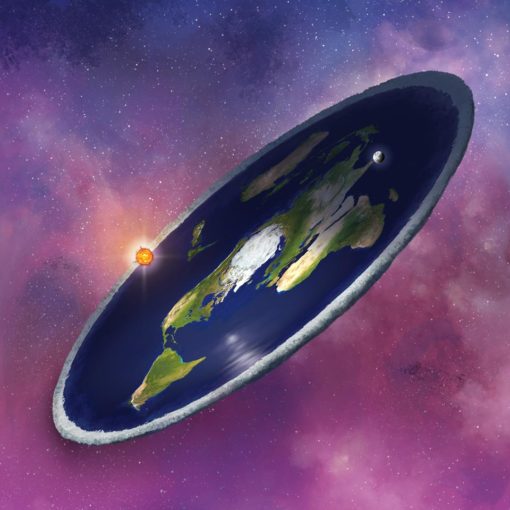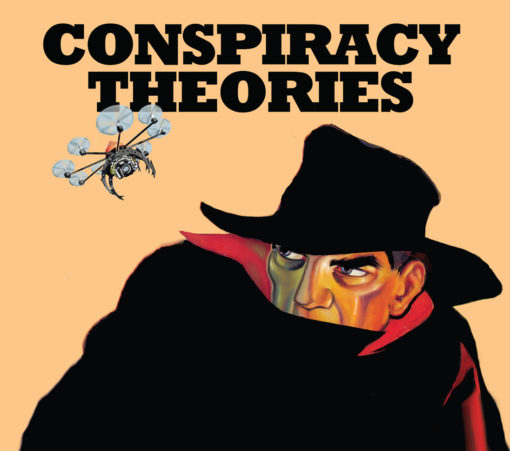In Science Salon # 101 Michael Shermer speaks with Hugo Mercier about his new book: Not Born Yesterday: The Science of Who We Trust and What We Believe.
Tags
-
browse by topic
conspiracy theories
eSkeptic for January 28, 2020
Water Fluoridation: Public Health, Not Poison

Fluoridation of public water sources remains controversial as a public health measure despite the strong evidence that fluoride prevents tooth decay. Harriet Hall, M.D. examines the evidence and the arguments for and against water fluoridation to see what holds up to scrutiny.
eSkeptic for January 14, 2020
In Science Salon # 99 Michael Shermer speaks with Bobby Duffy about his research into public perception across more than 40 countries, offering a sweeping account of the stubborn problem of human delusion: how society breeds it, why it will never go away, and what our misperceptions say about what we really believe. PLUS: Harriet Hall, M.D. examines the evidence and the arguments for and against water fluoridation to see what holds up to scrutiny.
Virtue Signaling, Memory, Myth, and JFK
In Science Salon # 93 Michael Shermer speaks with evolutionary psychology professor Geoffrey Miller about his book: Virtue Signaling: Essays on Darwinian Politics and Free Speech. Plus, Michel Jacques Gagné examines the reasons shocking events like the Kennedy assassination give rise to conspiracy myths.
From Camelot to Conspiracy: Memory, Myth, and the Death of JFK

Why did JFK’s untimely death produce so many clashing interpretations of one of the most meticulously documented periods of history? This article examines the reasons shocking events like the Kennedy assassination give rise to conspiracy myths. Such stories, though based on ostensibly historic events, serve a contemporary agenda, namely by scapegoating a source of existential evil and promoting a paranoid counter-ideology to defeat it. This essay appeared in Skeptic magazine 22.4 (2017) and was presented to the 2017 Concordia-Vanier Liberal…
Constructive Conspiracism: Why We Are Wired for Detecting Danger

In this article, originally published in Quillette on Halloween, October 31, 2019, Dr. Shermer argues that patternicity, agenticity, pessimism, the negativity bias, and the Second Law of Thermodynamics provides a deeper explanation for why conspiracy theories are so popular and enduring. The article is based on Dr. Shermer’s new course from Audible and The Teaching Company on Conspiracies and Conspiracy Theories.
eSkeptic for November 5, 2019
In Science Salon # 90 Michael Shermer speaks with world renowned biological anthropologist Mel Konner who examines the nature of human nature, including (and especially) in his new book on the nature of religiosity. PLUS: In an article originally published in Quillette on Halloween, October 31, 2019, Dr. Shermer argues that patternicity, agenticity, pessimism, the negativity bias, and the Second Law of Thermodynamics provides a deeper explanation for why conspiracy theories are so popular and enduring. The article is based…
eSkeptic for September 17, 2019
We are pleased to announce Dr. Michael Shermer’s brand new 12-lecture Audible Original Course: Conspiracies & Conspiracy Theories — What We Should and Shouldn’t Believe — and Why, available now from audible.com. PLUS, in Science Salon # 83, Michael Shermer speaks with Peter Boghossian about his new book How to Have Impossible Conversations: A Very Practical Guide.
eSkeptic for June 15, 2018

No event in the twentieth century did more to popularize conspiracy theories and confuse the general public than the assassination of President Kennedy. By educating people about what actually happened to JFK, and how conspiracy theorists have deliberately lied about it, James K. Lambert hopes that we can also get the general public to better see the lies (aka “fake news”) of today.
Conspiracy Theorists, and the Harm They Do

No event in the twentieth century did more to popularize conspiracy theories and confuse the general public than the assassination of President Kennedy. By educating people about what actually happened to JFK, and how conspiracy theorists have deliberately lied about it, James K. Lambert hopes that we can also get the general public to better see the lies (aka “fake news”) of today.
eSkeptic for March 21, 2018

There is growing conspiracy theory belief that the Earth is not a globe, but a flat disc. According to believers, government forces promote a completely fictitious model of the cosmos in order to conceal the true nature of the Earth. Daniel Loxton examines whether these claims are true.
Is the Earth Flat?

There is growing conspiracy theory belief that the Earth is not a globe, but a flat disc. According to believers, government forces promote a completely fictitious model of the cosmos in order to conceal the true nature of the Earth. Daniel Loxton examines whether these claims are true.
Ultraterrestrials
![Image by Comfreak via Pixabay.com (https://pixabay.com/en/ufo-aliens-landscape-evening-1673929/) [PUBLIC DOMAIN]](https://www.skeptic.com/wordpress/wp-content/uploads/ufo-1673929_1920-by-comfreak-2x-510x510.jpg)
How useful are eyewitness reports and “investigations” by UFO proponents? In this week’s eSkeptic, psychology professor Dr. Terence Hines reviews How UFOs Conquered the World: The History of a Modern Myth, by David Clarke.
eSkeptic for August 23, 2017
![Image by Comfreak via Pixabay.com (https://pixabay.com/en/ufo-aliens-landscape-evening-1673929/) [PUBLIC DOMAIN]](https://www.skeptic.com/wordpress/wp-content/uploads/ufo-1673929_1920-by-comfreak-2x-510x510.jpg)
How useful are eyewitness reports and “investigations” by UFO proponents? In this week’s eSkeptic, psychology professor Dr. Terence Hines reviews How UFOs Conquered the World: The History of a Modern Myth, by David Clarke.
14-11-19
On November 22, 1963, President John F. Kennedy was assassinated by lone-gunman Lee Harvey Oswald. Yet, about three-quarters of Americans believe that President Kennedy was the victim of a multi-shooter conspiracy. In this week’s eSkeptic, Michael Shermer discusses several psychological factors at work that allow conspiracy theories to persist.
14-11-12
Since 1992, the Skeptics Society has sponsored over 350 of the biggest names in science in our Distinguished Science Lecture Series at Caltech, covering the most advanced, leading-edge discoveries, and controversial topics in all of science. Now we want to take it to a whole new level, and aim to reach millions of people around the world following the TED model. Find out more…
Conspiracy Theories: Who Believes Them, and Why? How Can You Determine if They are True or False?

What is a conspiracy theory, why do people believe in them, and why do they tend to proliferate? Why does belief in one conspiracy correlate to belief in others? What are the triggers of belief, and how does group identity factor into it? How can one tell the difference between a true conspiracy and a false one? … Download the free PDF
14-10-15
Among the strangest of all bizarre pseudoscientific notions is the idea that ordinary contrails formed by high-flying aircraft are somehow a government conspiracy to spray us with toxic chemicals. In this week’s eSkeptic, Donald R. Prothero discusses how “chemtrail” conspiracy thinking fails the science literacy test.
“Look Up!” Find Your Path Towards Blue Skies Ahead
“Look Up!” Find Your Path Towards Blue Skies Ahead, a Carbon Comic by Kyle Sanders, appeared in Skeptic magazine 19.2 (2014).
14-06-04
In this week’s eSkeptic: The latest issue of Skeptic magazine (19.2): Boston Bombing Conspiracy Theories; Shermer asks whether deterrence prohibits the total abolishment of nuclear weapons; MonsterTalk discusses the legends and facts behind the Mongolian Death Worm; and Loxton reflects on monster hoaxes—and Discovery Channel’s tarnished reputation.
SKEPTIC App
Whether at home or on the go, the SKEPTIC App is the easiest way to read your favorite articles. Within the app, users can purchase the current issue and back issues. Download the app today and get a 30-day free trial subscription.








